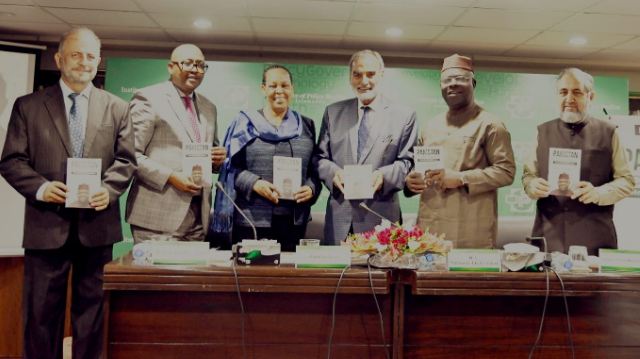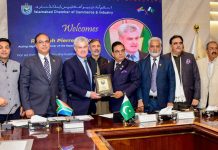DNA
ISLAMABAD, OCT 29: Pakistan should forge a deeper connection with Africa to transform the perception of the country and open doors for fruitful collaboration as well as move forward from ‘Look Africa’ toward ‘Enter Africa,’ said H.E. Mohammed Bello Abioye, the outgoing High Commissioner of Nigeria to Pakistan, during a farewell session and launch of his memoirs Pakistan: How I Saw It – Memoirs & Reflections, published by IPS Press, the publishing arm of Institute of Policy Studies (IPS).
The session was also addressed by Khalid Rahman, chairman, IPS, Ambassador (r) Syed Abrar Hussain, vice chairman, IPS, Mthuthuzeli Madikiza, High Commissioner of South Africa to Pakistan, Mary Nyambura Kamau, High Commissioner of Kenya to Pakistan, and attended by officials from the Nigerian Embassy.
Speaking about the book, H.E. Abioye stated that Pakistan How I Saw It: Memoirs & Reflections is a game-changing read as it challenges stereotypes and encourages a fresh perspective on Pakistan, which for too long has been misrepresented in books and media that paint a negative picture of the country.
Drawing on the background and content of the book, he stated that the common experiences of both countries can serve as a foundation for broader cooperation in various fields. In this regard, he mentioned governance as a critical aspect of development and its role in fostering stability and progress.
He mentioned that Pakistan has significant potential in the science and technological sectors. With the right governance, this potential can catalyze a more positive relationship between Nigeria and Pakistan and become a stepping stone for collaborative efforts that could benefit both nations.
In his remarks, Khalid Rahman said this book is based on the personal experiences of a seasoned diplomat that would be beneficial for people coming to Pakistan or going to Nigeria. Complimenting the author for the book’s emphasis and content, he mentioned that such memoirs help the foreign world understand the true picture of Pakistan as well as benefit the residents of the host country about how they are perceived outside the country.
He emphasized that diplomats should increasingly record their experiences and observations in a similar manner to propagate a country’s true image, which has become increasingly challenging in today’s post-truth era rife with misinformation and disinformation.
Endorsing H.E. Abioye, he maintained that governance, as the root cause of development problems, cannot be corrected in one day. A key issue of governance in Pakistan is the electoral system, and to counter this, Pakistan should move to a hybrid system that incorporates the elements of both first past the post and proportionate representation, he said.
Earlier, Abrar Hussain elaborated on the IPS’ Africa Program, including a lecture series on Pakistan’s foreign policy concerning Africa.

















